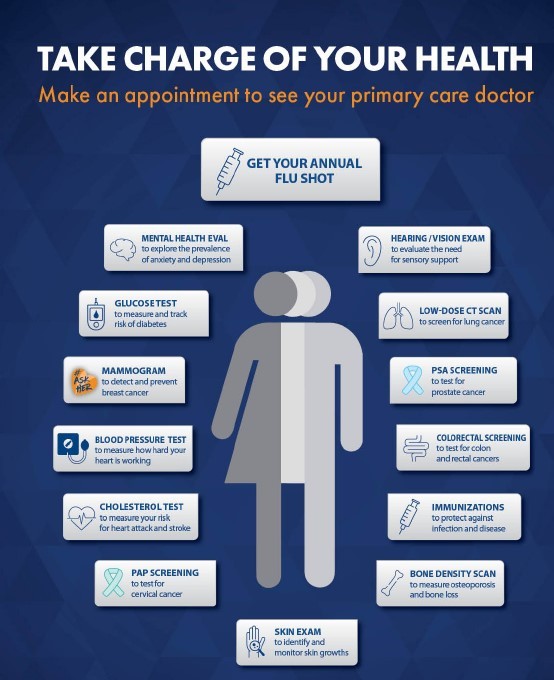Prioritizing Wellness: A Guide to Essential Adult Health Screening
 Maintaining optimal health is a lifelong journey, and one crucial aspect of this journey is regular health screenings. These screenings are proactive measures that empower adults to take charge of their well-being by detecting potential health issues early on. In this blog post, we will explore the importance of adult health screenings and highlight key screenings that contribute to a proactive approach to wellness.
1. Understanding the Significance of Health Screenings:
Health screenings are not just reserved for when you're feeling unwell. They are preventive measures designed to catch potential health concerns before they become serious issues. By identifying risks early, individuals can make informed decisions to improve their lifestyle and overall health.
2. Common Adult Health Screenings:
- Blood Pressure Monitoring:
High blood pressure often has no symptoms but can lead to serious health problems. Regular blood pressure checks are essential for preventing heart disease and stroke.
- Cholesterol Levels:
Monitoring cholesterol levels helps assess the risk of heart disease. High cholesterol can be managed through lifestyle changes or medication.
- Blood Sugar Tests:
Regular checks for blood sugar levels are crucial for detecting diabetes or prediabetes. Early intervention can prevent complications associated with diabetes.
- Cancer Screenings:
Depending on factors such as age, gender, and family history, screenings for cancers like breast, colorectal, and prostate cancers are recommended.
- Bone Density Tests:
Especially important for postmenopausal women, these tests assess bone health and help detect conditions like osteoporosis.
3. Frequency and Timing:
The frequency of screenings can vary based on individual health factors and risk levels. Consultation with healthcare professionals is essential to determine an appropriate screening schedule.
4. Taking a Holistic Approach:
Health screenings are just one aspect of maintaining overall well-being. Combining regular exercise, a balanced diet, sufficient sleep, and stress management contributes to a holistic approach to health.
5. Empowering Individuals Through Knowledge:
Understanding the purpose and significance of each screening empowers individuals to actively participate in their healthcare journey. Open communication with healthcare providers ensures a personalized and effective approach to screenings.
Conclusion:
Investing in your health through regular screenings is an investment in your future well-being. By staying proactive and informed, individuals can identify potential health risks early, allowing for timely interventions and a higher quality of life. Prioritize your health, and make regular health screenings a cornerstone of your wellness routine.
Maintaining optimal health is a lifelong journey, and one crucial aspect of this journey is regular health screenings. These screenings are proactive measures that empower adults to take charge of their well-being by detecting potential health issues early on. In this blog post, we will explore the importance of adult health screenings and highlight key screenings that contribute to a proactive approach to wellness.
1. Understanding the Significance of Health Screenings:
Health screenings are not just reserved for when you're feeling unwell. They are preventive measures designed to catch potential health concerns before they become serious issues. By identifying risks early, individuals can make informed decisions to improve their lifestyle and overall health.
2. Common Adult Health Screenings:
- Blood Pressure Monitoring:
High blood pressure often has no symptoms but can lead to serious health problems. Regular blood pressure checks are essential for preventing heart disease and stroke.
- Cholesterol Levels:
Monitoring cholesterol levels helps assess the risk of heart disease. High cholesterol can be managed through lifestyle changes or medication.
- Blood Sugar Tests:
Regular checks for blood sugar levels are crucial for detecting diabetes or prediabetes. Early intervention can prevent complications associated with diabetes.
- Cancer Screenings:
Depending on factors such as age, gender, and family history, screenings for cancers like breast, colorectal, and prostate cancers are recommended.
- Bone Density Tests:
Especially important for postmenopausal women, these tests assess bone health and help detect conditions like osteoporosis.
3. Frequency and Timing:
The frequency of screenings can vary based on individual health factors and risk levels. Consultation with healthcare professionals is essential to determine an appropriate screening schedule.
4. Taking a Holistic Approach:
Health screenings are just one aspect of maintaining overall well-being. Combining regular exercise, a balanced diet, sufficient sleep, and stress management contributes to a holistic approach to health.
5. Empowering Individuals Through Knowledge:
Understanding the purpose and significance of each screening empowers individuals to actively participate in their healthcare journey. Open communication with healthcare providers ensures a personalized and effective approach to screenings.
Conclusion:
Investing in your health through regular screenings is an investment in your future well-being. By staying proactive and informed, individuals can identify potential health risks early, allowing for timely interventions and a higher quality of life. Prioritize your health, and make regular health screenings a cornerstone of your wellness routine.

